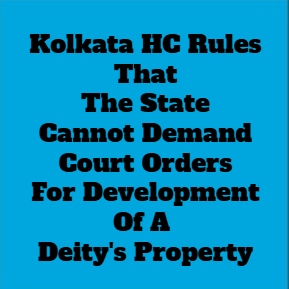

By Linus Garg
First publised on 2025-11-24 06:40:28
The Calcutta High Court has settled a question that municipal bodies often complicate. It held that shebaits of a private debuttar estate do not need prior permission from a civil court to develop the property. Their only obligation is to act in good faith and in line with the purpose of the endowment.
The case reached court after the Kolkata Municipal Corporation refused to process a building plan for land dedicated to a deity, arguing that the shebaits had not secured judicial approval. The High Court rejected this approach. It pointed out that shebaits are not "trustees" under the Indian Trusts Act. Their authority comes from Hindu law, where they function as custodians who manage the deity's property for its benefit. Since no statute requires a court order for routine development, the municipality cannot invent such a condition.
The ruling matters for two reasons. First, it prevents civic bodies from inserting themselves into decisions that the law leaves to the shebaits. Second, it recognises the financial reality of many temples. Upkeep is expensive. Development, when done responsibly, helps sustain worship rather than undermine it.
But the judgment also draws a boundary. Shebaits must act in the deity's interest. Development cannot become a pretext for turning religious land into a commercial venture with only a token nod to the endowment.
For now, the message is clear. The state can regulate construction, but it cannot demand judicial permission where the law provides none. Shebaits can manage and develop debuttar property without being dragged through unnecessary procedural hoops.
This order is likely to benefit many such temples which are going to seed as the shebaits do not have money for upkeep. Judicious use of vested property can turn it into a source of earning and can ensure that the temples do not vanish.











